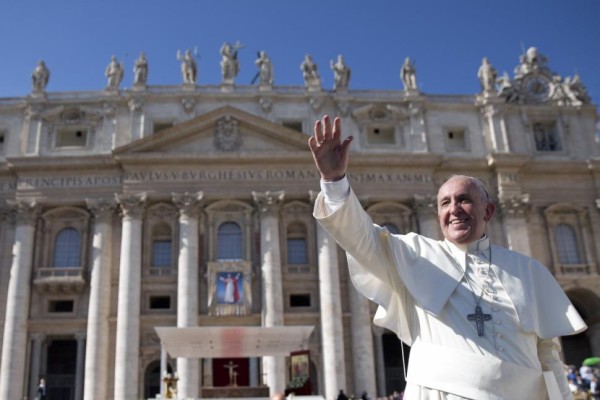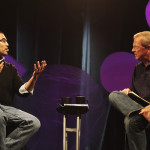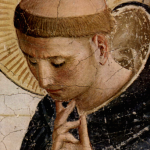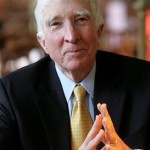Is the Catholic Church a Force for Good?
by Matt Nelson
Filed under History, The Church
Western civilization is greatly indebted to the Catholic Church. Modern historical studies—such as Dr. Thomas E. Woods' How The Catholic Church Built Western Civilization—have demonstrated with force and clarity that it is the Catholic Church who has been the primary driving force behind the development and progress of the civilized world.
The Church has provided innumerable 'goods' for the benefit of humanity. Nonetheless, modern critics assert that no amount of good could outweigh the evil the Church has allegedly committed in contrast. Talk is cheap, however. We must look at the evidence. Has the Church really been an irreconcilable force for evil in the world?
Big Questions
There are three principal issues repeatedly brought to the table by adversaries of the Catholic Church: religious violence, priest scandals, and ill-treatment of women. But do these objections hold water when their integrity is put to the test? And are they enough to render the Church "no good" in our final analysis?
Now let's be clear: throughout the duration of this piece, I am not seeking in any way to deny or defend the sins of any Catholic individual or group. The chief question I propose is not whether there have been malicious members of the Catholic Church (there obviously have been). The question at hand is whether the Catholic Church as a whole ought to be considered a force for evil.
Let's consider briefly the general assertion that religion is the chief cause of violence in the world. This position, in fact, is not supported by the data. Joe Heschmeyer has shown this quite articulately in his recent article at Strange Notions, Is Religion Responsible For The World's Violence?
Evil members of a Church do not necessarily indicate an evil Church. One must be cautious; because this line of reasoning commits an error in logic called the fallacy of composition. We would not say, "the elephant consists of tiny parts, therefore the elephant is tiny"; and thus, we should not say that the Church is sinister because she has sinister members. The parts do not necessarily define the whole; and in the case of the Catholic Church, the parts justify the whole. As G.K Chesterton writes in The Everlasting Man:
“The Church is justified, not because her children do not sin, but because they do. ”
Reclaiming The Homeland
Sound historical scholarship has shown—contrary to what modern textbooks might falsely suggest—that the Crusades ought not be considered such a black mark in Catholic Church history. Dr. Diane Moczar summarizes the facts in her historical defense, Seven Lies About Catholic History:
"To recapitulate: the Crusades were a response to unprovoked Muslim aggression against Christian states, as well as a response to the enslavement, killing and persecution of countless followers of Christ. They were not examples of European colonialism or imperialism, which lay far in the future, nor were they intended to convert anybody; they were a military answer to a military attack." (p.73)
Moczar demonstrates that the Crusades were largely just (see CCC 2302-2317) and with far-reaching benefits for the people of Europe. She cites historian Louis Bréhier, who also concludes:
"It would be unjust to condemn out of hand these five centuries of heroism which had such fertile results for the history of Europe and which left behind in the consciences of modern peoples a certain ideal of generosity and a taste for sacrifice on behalf of noble causes....." (from The Crusades: The Victory Of Idealism)
Steven Weidenkopf, a lecturer of Church History at the Notre Dame Graduate School of Christendom College, has also clarified the true nature of the Crusades in his footnote-laden treatise, The Glory of the Crusades. Weidenkopf's title is bold, but his analysis is fair and evidence based. In his scholarly assessment of the Crusades he carefully notes:
"To recognize the glory of the Crusades means not to whitewash what was ignoble about them, but to call attention to the import in the life of the Church" (p.14).
Moczar likewise recognizes that not all things regarding the Crusades are to be "glorified." Nonetheless, both Moczar and Weidenkopf decisively demonstrate in their research that, by and large, the Catholic Church's participation in the Crusades ought not be considered evil nor unjust.
Handling Heretics
The real story of the Inquisition is—like the Crusades—not congruent with what one finds in today's error-ridden history textbooks.
Statistics regarding the total number of Inquisition-related deaths have been shamefully embellished by antagonists of the Church, with some asserting numbers in the millions. Though the precise numbers are foggy, recent scholarship has put the number of deaths at just a few thousand over several centuries.
Modern research by historical experts, such as Henry Kamen, Benzion Netanyahu and Edward M. Peters, have demonstrated that the Inquisition was not nearly as harsh or cruel as popularly suggested. Overturning traditional views, they have shown that the Church courts were often both patient and fair in their treatment of heretics. In fact, Church officials were so reasonable in the Inquisition process that heretics in the secular courts (heresy was also a political concern) would blaspheme with hope that they might be transferred to the more merciful Church inquisitors.
This is not to deny, however, that the actions of some Christians were unjust. Moczar concludes:
"Were there cruel inquisitors in some places? Of course. Were methods of interrogation distasteful to modern sensibilities? Sure... [But] given its formidable task of guarding the purity of the Faith in Christian souls, however, the overall record of the Inquisition in dealing with heresy is not only defensible but admirable." (p. 102)
Celibacy Isn't The Problem
This is not a defense of the guilty. It is a defense of the unjustly accused and stigmatized. The data is clear—celibate Catholic priests are no more likely to abuse children than clergy from any another denomination, or even teachers and other secular adult leadership. As Ernie Allen, the president of the National Center for Missing and Exploited Children, has stated:
“We don’t see the Catholic Church as a hotbed of this [abuse] or a place that has a bigger problem than anyone else." (Pat Wingert, “Mean Men,” Newsweek, April 8, 2010)
Professor of psychology, Dr. Thomas Plante, agrees with Allen:
"Catholic clergy aren’t more likely to abuse children than other clergy or men in general." ("Do the Right Thing", psychologytoday.com, March 24, 2010)
Celibacy is not the problem—and Dr. Chris Kaczor has made this decisively clear. He summarizes the evidence with this statement:
"The evidence is substantial and confirmed by psychologists, researchers, and insurance companies: Priestly celibacy is not a risk factor for the sexual abuse of children." ("Celibacy Isn't The Problem", This Rock, vol. 21, 5)
In his vastly informative book, The Seven Big Myths about the Catholic Church, Dr. Kaczor's research conclusively disarms the celibacy-leads-to-pedophilia myth and puts it to rest once and for all.
Indeed, Catholic clergy should be held to a higher standard—the highest standard in fact—but it is unreasonable to condemn the whole priesthood because of the sins of an ultra-minority. There is simply no good reason to fear Catholic clergy any more than other religious leaders, teachers or the general population. I say without hesitation (and as a dad) that Catholic priests, by and large, are among the most trustworthy citizens of our society today. And the data agrees.
"She Shall Be Called Woman"
Finally, is the Church's view on women really immoral? Let's begin with the fiery issue of "female ordination": Why aren't women allowed to serve as priests in the Church? Is this not a violation of gender equality?
Properly understood, this is a matter of the Church's incapability to ordain women due to what a Catholic priest is. It is the nature of the priesthood that makes female ordination an impossibility. These key facts may help to underline this point:
I) Jesus called twelve apostles, all of whom were men (Mk 3:14-19; Lk 6:12-16)
II) The twelve apostles ordained men only to succeed them (1 Tim 3:1-13; 2 Tim 1:6; Titus 1:5-9)
III) These men were given a special gift and authority to serve in persona Christi or "in the person of Christ" (see 2 Cor 2:10; John 20:21-23)
IV) Christ was a man; therefore those who serve "in his person" must also be men.
Therefore a female Catholic priest is about as possible as a male mother. The nature of the Catholic priesthood renders female ordination impossible, just as male mothers are an impossibility because of the nature of motherhood. Indeed, male-only ordination is discriminatory; but this is not a matter of preference but of deference to the "nature of things"; for it is the nature of nature to discriminate.
St. John Paul the Great understood this with profound clarity:
"The Church has no authority whatsoever to confer priestly ordination on women and...this judgment is to be definitively held by all the Church’s faithful" (Ordinatio Sacerdotalis 4).
What was Jesus' attitude toward women? Once again, we turn to the words of St. John Paul the Great:
"When it comes to setting women free from every kind of exploitation and domination, the gospel contains an ever relevant message that goes back to the attitude of Jesus Christ himself. Transcending the established norms of his own culture, Jesus treated women with openness, respect, acceptance, and tenderness. In this way he honored the dignity that women have always possessed according to God's plan and in his love." (Letter to Women, 3)
Like her Founder, the Catholic Church reveres 'woman' and attributes to her the highest dignity. The mother of Christ, for example, has been widely revered by Catholics from the earliest centuries of Christianity as the mother of all Christians (Jn 19:26-27). No person in history—except perhaps Christ Himself—has received more love and honour than Mary. The Church has also named four female Doctors of the Church—Sts. Teresa of Avila, Catherine of Siena, Therese of Lisieux and Hildegard of Bingen—and recognized them for their extraordinary influence on the life of the universal Christian Church.
And is it not true that women largely tend to avoid places where they are unfairly discriminated against and patronized? If the Catholic Church really treated women unjustly, would we not expect a female aversion to the Church? Surely. But this is not what we find.
Notre Dame theologian, Catherine Lacugna, states:
85% of those responsible for altar preparation are women. Over 80% of the CCD (religious formation) teachers and sponsors of the catechumenate are women. Over 75% of adult Bible study leaders or participants are women. Over 70% of those who are active in parish renewal and spiritual growth are women, and over 80% of those who join prayer groups are women. Nearly 60% of those involved with youth groups and recreational activities are women. (Catholic Women As Ministers And Theologians, 240)
Women are not afraid of the Church. They are attracted to it. Why? Because she fights for the beauty and dignity of femininity as no other institution on earth does.
Referring to the words of his saintly predecessor, Pope Benedict XVI said these words in praise of women:
"As my venerable and dear Predecessor John Paul II wrote in his Apostolic Letter Mulieris Dignitatem: "The Church gives thanks for each and every woman.... The Church gives thanks for all the manifestations of the feminine 'genius' which have appeared in the course of history, in the midst of all peoples and nations." (General Audience, February 14, 2007)
Final Thoughts
In the final analysis, the Catholic Church is unquestionably a force for good in the world—indeed a force for greatness. She always has been; and because the gates of hell can never prevail against her, she always will be. We have Christ's promise.
Yes, the Church has proven herself to be the lifeline of our civilization—and without her—humanity will fail to thrive. As the great defender of the Church, Hilaire Belloc, concluded in Survivals And New Arrivals:
"If the influence of the Church declines, civilization will decline with it... Our civilization is as much a product of the Catholic Church as the vine is the product of a particular climate. Take the vine to another climate and it will die."
May God continue to bless His Church for goodness' sake.
Related Posts
Note: Our goal is to cultivate serious and respectful dialogue. While it's OK to disagree—even encouraged!—any snarky, offensive, or off-topic comments will be deleted. Before commenting please read the Commenting Rules and Tips. If you're having trouble commenting, read the Commenting Instructions.













